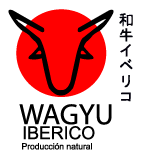
Wagyu Ibérico is a family business with a farming tradition located in the north of Cáceres, in the foothills of Santibáñez el Alto, on the banks of the Borbollón reservoir.
In our pastures we dedicate ourselves to the breeding and fattening of the animals, trying to interfere as little as possible in their daily lives. They are only disturbed to carry out the official sanitation, weaning of the calves, the crotalisation of the calves at the time of birth and health treatments.

With the desire to improve, we have perfected the quality of the meat from our animals, embarking on different projects with great enthusiasm. In 2006, we became the first livestock farm in Spain to have our own optional beef labelling specifications and the only one to certify 100% of the animals on the farm, approved by the Junta de Extremadura and audited by CERTICAR in accordance with European Union regulations.
In 2013 the specification was extended and the denomination Wagyu Ibérico was incorporated, referring to animals with a minimum of 50% Wagyu genetics. At that time we were the only pliego in Spain and possibly in the whole of Europe to certify that it had wagyu genetics, being audited again by CERTICAR.

We also obtained the McDonald’s Flashingfarm Europe title, being the only Spanish farm with this mention and one of the 5 in Europe. Here you can see both the quality of life of the animals and the way we work and integrate with the rural society where we are located and its economy.
In 2015, we extended our optional labelling specifications to meat processing (sausages, sausages and hamburgers) and, in 2016, we obtained DEHESA BY PEFC certification.
OUR PROJECT

Our star project is the Iberian Wagyu, which began in 2011, when we noticed the loss of hardiness in our livestock, wanting to return to the crossbreeding of our origins, the Moorish breed. In response, the possibility of introducing a breed of Japanese origin, with high intramuscular infiltration, was suggested. After studying it to check its viability, we began to introduce it into our livestock at the beginning of 2012.
We found that it was a breed with a good capacity to adapt to our pasture and we decided to cross the wagyu stallion with crosses of morucha with limusin and charoles, in grades f1, f2 and f3. Seeing the great increase in quality, we decided to make an exclusive line for Iberian wagyu and not use it only to improve the quality or hardiness of our livestock, thus extending the project to the production of high quality meat.
Subsequently, we introduced more breeds of cows into the project: f1 Wagyu born and bred at the farm; Morucha in brown; Cachena from Galicia, which is in danger of extinction; Limusín; Charolés; Casinas from Asturias; Berrenda en colorado; Blanca cacereña; Angus; Galloway and Highland.
We are still seeing how wagyu genetics works in the different breeds, as each of these tests, from the time of the dam’s pregnancy, takes a minimum of 30 months to verify the final results.
We have managed to produce meat of the highest quality, due to its meat with a high level of intramuscular infiltration, tenderness, depth of flavour and colour of the meat and fat. All of it is certified with our quality brand Wagyu Ibérico, with crosses of the Wagyu breed, the Morucha and meat aptitude breeds (Limusín or Charolés).

In addition to our Wagyu Ibérico project, we have two others: Angus Ibérico and Buey Ibérico. We started with the Buey Ibérico project in 2015, marketing the products under this brand in 2021.
As for the Angus, we started breeding it in 2017 and we also started marketing it under the Angus Ibérico brand in 2021. Our animals have different genetics, such as Scottish, Portuguese or Argentinian.



This is a joint project where we have changed a number of farm management assumptions:
- The professionalisation of the sector’s means of production.
- The use of Dehesa land, without overexploitation, together with its reinvestment.
- Creation of differentiated and differentiating products.
- The search for recognition of the quality of the Dehesa products.
In order to professionalise the means of production, we have ensured that our employees are trained in the new developments, and we have also taken advantage of their knowledge of the traditional management of the Dehesa. We have also adapted machinery that was being used in other sectors of agriculture and livestock farming to improve our work. An example of this is the collection and distribution of feed.
We not only seek our own benefit, but also help through the associations to which we belong to contribute to the evolution of our environment. Some of these associations are:
- Asociación de Ganaderos 2008, based in Malpartida de Plasencia. It is represented in FEDEHESA, the National Federation of the Dehesa. Its aim is to raise awareness in Europe about the Dehesa, its value and its products.
- Asociación Wagyu de España (AWE), based in Coria. We are a reference for this breed at national and European level and we want the results of genetics, feeding and final products to be relevant, positioning Spain and Extremadura as an important point in the Wagyu breed.
- Asociación Somos Sierra de Gata. Its aim is to increase the quality of life of its inhabitants and visitors who come to the region to enjoy this unique environment.

In short, what we want to achieve is the management of our farm with economic viability in the short, medium and long term, as well as fusing innovation and tradition in the use of the dehesa while we enjoy this spectacular environment.









